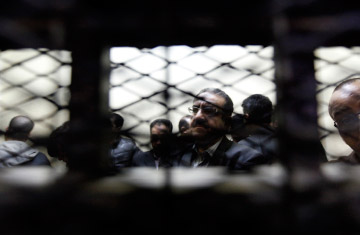
Accused Egyptian activists sit in a caged docket during the opening of their trial in Cairo on Feb. 26, 2012
Forty-three NGO workers, including 16 Americans, went on trial in Cairo on Sunday in a case that has sent U.S-Egyptian relations plummeting to their most serious low in decades. For hours, the 13 defendants who attended the session — all Egyptians — sat in the caged docket as a packed room of journalists, lawyers, families and spectators jostled and shouted in a paparazzi-like frenzy.
The civil-society workers, which include both foreign and local employees of prominent Washington-based democracy-promotion groups Freedom House, the International Republican Institute (IRI) and the National Democratic Institute (NDI), as well as the International Center for Journalists and the German Konrad Adenauer Foundation, are charged with operating without a license and receiving and distributing millions of dollars worth of foreign funding to Egyptian political and civil-society groups.
The crackdown, which formally began in December with raids by Egyptian security forces on 17 NGO offices across the country, has sparked outrage in Washington. The U.S. Administration has threatened to slash the annual $1.3 billion aid package that it hands to Egypt's military, which took over to rule the country last year after a popular uprising ended the 30-year reign of President Hosni Mubarak. U.S. officials and NGO employees say the case, launched by the Minister of International Cooperation and Planning Fayza Aboul Nega, a Mubarak-era stalwart, is politically motivated because the democracy groups have operated in Egypt for years and have applied repeatedly for licenses. Still, a decision by the U.S. Congress late last year to make aid conditional — effectively placing guarantees on the country's progress toward a democracy — angered the generals and may have provoked a standoff over the NGO issue.
For an hour and a half on Sunday afternoon, chaos reigned in the New Cairo Court on the capital's northeast outskirts as people jostled for position around the defendants' docket. "Stand still, ass!" an Egyptian photographer shouted at the caged defendants at one point. None of the foreign defendants appeared in court on Sunday. Only seven of the 16 Americans remain in the country under travel bans. Some of them, including Sam LaHood — Egypt director of IRI and the son of U.S. Transportation Secretary Ray LaHood — have taken refuge at the U.S. Embassy. "There won't be any foreigners here because none of them have been served papers," Les Campbell, the regional director of NDI, told TIME shortly before the trial. He said that the prosecution had compiled some 2,200 pages of evidence but had not provided any of it to NDI. "We've never been given anything in writing. We only hear things in the media."
If convicted, the defendants could face sentencing of heavy fines and up to five years in prison. In an environment that has grown increasingly hostile to foreigners — and particularly Americans, who are viewed to have backed the Mubarak dictatorship — the Egyptian public has shown little sympathy for the NGO workers, whom they see as further examples of foreign meddling in Egyptian affairs.
While the formal charges don't yet directly include allegations of espionage, the civil-society workers are charged with preparing "reports of their activities" and delivering those reports to their headquarters abroad. Earlier this month, Egyptian state media declared that the groups had been involved in a plot to undermine the country's stability. The state press quoted testimony by Nega, in which she alleged that the U.S. government has worked actively through the NGOs to sow unrest. Hers is the longest witness testimony in the prosecution's files, according to a source close to the case, and a volunteer prosecutor at Sunday's hearing demanded that espionage charges be formally added to the case. Earlier this month, investigating judges described maps found in NGO offices that they said depicted Egypt divided into four sections — common regional designations on other maps but proof, Egyptian officials have said, of U.S. government plans to divide up Egypt. Speaking in front of Egypt's newly elected parliament on Sunday as the trial was ongoing, Prime Minister Kamal al-Ganzouri defended the case, saying that Egypt "won't back down or take a different route because of some aid or other," according to al-Jazeera.
